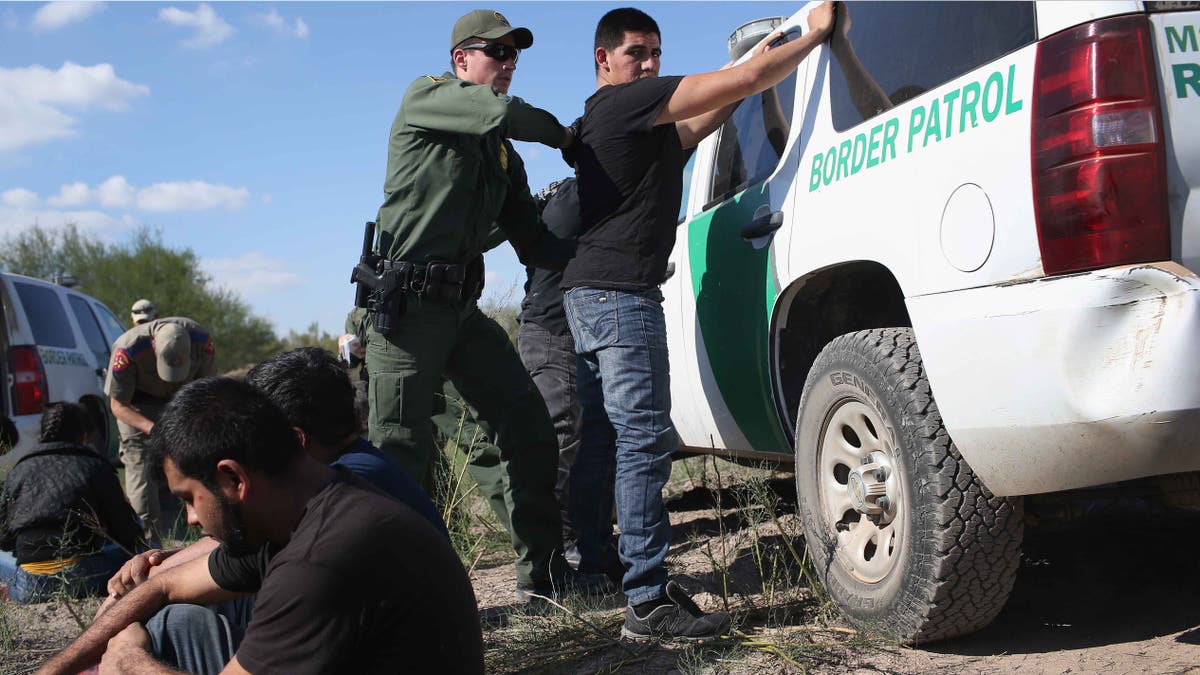
A Border Patrol agent body searches an undocumented immigrant on December 7, 2015 near Rio Grande, Texas. (2015 Getty Images)
NEW YORK – Conservative federal estimates value the smuggling of undocumented immigrants to the U.S. a $1.5 billion-a-year industry. And that money, they say, can be traced directly to the so-called coyotes who actually lead the migrants across the border.
In a massive operation launched by Immigration and Customs Enforcement (ICE) in 2014, a year in which the number of unaccompanied children crossing the border reached a historic peak, agents reported more than $2 million seized from transnational smuggling organizations.
To date, they claim, Operation Coyote has resulted in the arrest of nearly 1,100 people.
“Transnational criminal organizations are not doing this because they are trying to help undocumented aliens pursue the American dream,” Harry Jimenez, a special agent at Homeland Security Investigations, told Fox News Latino. “They are doing it because there is a lot of money to be made out of this.”
For this kind of pursuit federal agents work with banks and businesses that handle financial transfers, such as money wire exchange shops, which flag accounts with large balances that have been opened in Mexico but show withdrawals in locations near the border.
Usually, Jimenez explained, a person wanting to migrate to the U.S. responds to an ad or is approached by a front person in a smuggling chain. The journey begins once the partial or total fee is paid, a fund from which smugglers make withdrawals, for bribes for example, along the way. The bribes often are used to pay off policemen or cartel members for safe passage along their drug routes.
Sometimes the immigrant is passed on to other smugglers mid-journey, someone the traveler may never have met before and who may only be loosely connected to the first contact person. And migrants might be kept in stash houses while they wait for a truck or van - operated by yet another group - that can move them a little closer to their destination.
Each time the migrant changes hands, the rules may change. It is not uncommon that immigrants are held captive until their family pays more than the originally-agreed upon price or are trafficked to brothels until they earn more passage fare.
“Unfortunately, Hispanic families who want to do what’s best for their families are sending money to criminals and risking the lives of their loved ones, and that is terrible,” Jimenez said.
While it’s hard to say how many immigrants actually cross the U.S. border without documentation, Border Patrol statistics indicate that from October 2015 through January 2016, 45,071 unaccompanied minors and families were detained -- in only four months, it was already a third of the peak volume from 2014, when the number of families and unaccompanied minors was estimated at 137,272.
That’s a 102 percent increase in the number of unaccompanied minors and a 171 percent jump in families from the same period the year before.
Most of the unaccompanied minors of the most recent surge came from Guatemala, while minors with relatives tended to come from El Salvador. The number of immigrants from Mexico has dropped off drastically.
Operation Coyote is part of the government’s larger efforts to reduce the number of Central American immigrants coming to the U.S.
It includes ads across Central America warning about the dangers of traveling with human smugglers. The U.S. government has also offered $1 billion in aid to the “Northern Triangle” countries – Guatemala, El Salvador and Honduras – in exchange for reforms that might help stabilize the region.
In response, Guatemala’s Congress unanimously approved an anti-coyote law that allows the government to imprison smugglers for up to eight years – longer if the migrant is a child or a pregnant woman.
So far, however, the money appropriated by the U.S. government has barely made a dent in smuggling industry coffers. The loosely-affiliated network of smugglers is too flexible, experts say, and the likeliest to get caught are the lowest in the chain of command.
“Despite the fact that border crossing is at an all-time low – especially for Mexicans – there are coyotes in every city and people willing to help others cross the border for a fee,” said Jeremey Slack, a professor at the University of Texas at El Paso. “It is impossible to arrest all of them,” he added, saying that increased enforcement mostly “just results in changes in [their] tactics.”




















